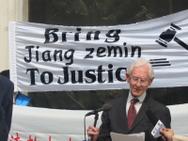On 25th of April 2004, UK Falun Gong practitioners held a symbolic public trial of Jiang Zemin in London to commemorate the fifth anniversary of 4.25, on which day of 1999, over 10,000 Chinese Falun Gong practitioners peacefully appealed for Falun Gong outside Zhongnanhai, Beijing. There was a Falun Gong press conference after the symbolic trial. During the press conference, the British Falun Dafa Association announced that Falun Gong practitioners in the UK would officially file a lawsuit against Jiang for Genocide. Lord Thurlow, the former senior diplomat, also made a speech in front of the Chinese embassy. The full text is as follows:
 |
The persecution of Falun Gong, continues over the past nearly five years in China and is the most massive in scale in human history. Directed against some 100 million Falun Gong practitioners, it is also the most intensively organised and highly resourced persecution of a group for their moral beliefs. It is accompanied by a vast propaganda campaign of lies and distortions to demonise the practice.
It is imperative that public opinion in the west should become awakened to the outrageous abuses that breach all the norms of civilised society and international law. China has both signed and ratified the UN Convention on Torture and has signed (but not yet ratified) the Convention of Civil and Political Rights but has flagrantly disregarded her obligations under both conventions, acting in these areas as a rogue state. This calls into question her fitness to be treated as an acceptable member of the international community.
But there has been a virtual blanket of silence in the main media about the facts. The corporate world of commerce and industry is impressed by the vast potential market of China’s backward economy at last spurts forward, largely impelled by huge foreign capital investment. Corporations do not wish to undermine confidence in China and the media tend to reflect their interest. Government policy is also influenced by their special interests through dependence on contributions to party election funds. Such factors contribute to reluctance to give offence by publicly stating ugly facts. But the British and other governments have made strong public and private protests.
There are however various ways by which disapproval can be demonstrated. Legal actions can be initiated in western courts against named perpetrators and instigators of the abuses. Such actions have been launched or are being prepared in over fifteen countries including the UK both in the criminal and civil fields. In the USA court judgments have been given in favour of civil claims for damages from victims of tortures. Another opportunity to point to the international requirement for reform lies in administrative actions to impede the foreign travel of individuals. The Canadian government has agreed to ban the entry into Canada of a list of Chinese officials. The United States has a similar list. A submission is under preparation here to seek the introduction of a similar ban on entry. Britain is already party to the agreed EU policy of preventing the entry into the European Union of certain Myanmar officials. Legal aspects of the submission to the FCO are being handled by Matthew Gold & Company, solicitors, to whom we express our thanks.
We ask all organs of the media to do what they can to bring the facts of the Chinese persecution before the public. The importance of this was emphasised in January by the International Forum on Genocide in Stockholm attended by some fifty government delegates. They issued a Declaration calling on governments to increase their efforts against genocide, reaffirming that genocide is stated in the UN Convention of 1978 to include suppression of groups on grounds of their beliefs.
* * *
You are welcome to print and circulate all articles published on Clearharmony and their content, but please quote the source.










 more ...
more ...